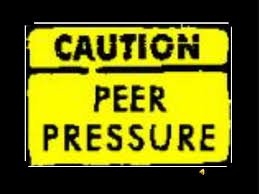In an earlier post (On the Way to Becoming an Adult), I described advantages and disadvantages in relation to the developing teenage brain. While the draw to novelty, risk, and peer relations helps to prepare teenagers for becoming independent adults, their impulsivity can also be hazardous. As teenagers are finding their way through adolescence, it is important they learn ways to manage peer pressure and exercise self-determination.
Teenagers need help in learning to anticipate consequences. The exercise of poor judgment in a single moment can have long term ramifications. Poor decision-making is reinforced when we escape negative consequences, and a false sense of safety develops. Teenagers must learn not to underestimate the impact that poor decisions can have on their lives.
Teenagers must be prepared with what they are going to say when they need to assert themselves with peers. For example, “No thanks.” “I wouldn’t care to.” “Thanks, but I’m good.”
They need to be able to hold themselves up, look their peers in the eye, and project confidence when they express their intentions.
It is helpful for teenagers to think about how they are choosing their friends: “Am I comfortable with friends who are discontent, negative, rebellious, cynical, reckless, self-destructive, and lacking in ambition?” or “Do I value friendship with others who are motivated, confident, productive, polite, appreciative, considerate, and encouraging. “With whom do I identify and with whom would it be more constructive for me to be friends?”
It is important for teenagers to understand situational behavior, that is, how greatly the situation that we are in can affect our feelings and our actions. A large collection of studies in social psychology demonstrates the amazing degree to which individuals follow along with the behavior of their peers in situations in which they would never make the same decisions if they were acting on their own without the contagion effect. Our teens need to take the time and think “Would I really do this if I were making this decision on my own?” “Am I strong enough and confident enough to do what I know is right no matter what my friends think?”
It is crucial that teenagers carefully consider their peer relations and that they are prepared to act thoughtfully in situations with peers in which they will be responsible as individuals for the decisions they make.




